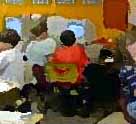|
|
|
Vol 8|No 1|September|1998 |
|
Networked schools quickly learn that their investments in technology will pay off most handsomely when they focus on the formation of an information literate school community. Information literacy has three major components, all of which contribute to learners being able to "make up their own minds." 1. Prospecting: The first component of information literacy relates to the discovery of relevant information. This prospecting requires navigation skills as well as the ability to sort, sift and select pertinent and reliable data. 2. Interpreting: It is not enough to locate numbers, text and visual data. The learner must be able to translate data and information into knowledge, insight and understanding. The learner must be skilled at interpretation. Huge number sets have little value if we do not know how to "crunch" the data and convert it into charts or other forms which show relationships and help us to resolve issues and questions. 3. Creating New Ideas: True information literacy includes the development of new insights. We cannot be satisfied with rehashing the ideas of others. We expect to see fresh knowledge. We expect more than thinly disguised plagiarism. It may take several years for a school to approach the goal of universal information literacy. The journey requires a substantial and sustained commitment to professional development and program development. How does a school know when it deserves to be called an information literate school community? When the following characteristics are abundantly evident, the phrase is well deserved . . .
How can we tell that our school is approaching a mature level of information literacy? We assess the Traits of an Information Literate School, rewarding between zero and four stars for each trait according to where our school has progressed on what is for most a five year journey.
Download Word 98 version
Note: For an excellent overview of information literacy, consult Linda Langford’s article, "Information Literacy: A Clarification" in School Libraries Worldwide, Volume 4, Number 1. It was Linda’s article and her mention of "an information literate community" which prompted the writing of this article. Volume 4, Number 1, January 1998.
References INFORMATION LITERACY BIBLIOGRAPHY Bibliography from ATLC's publication, Information Literacy: An Advocacy Kit for Teacher-Librarians. Compiled and edited by Victoria Pennell. http://www.sbe.saskatoon.sk.ca/~atlc/infolitb.htm As is stressed in "Learning for the future" p.4- Libraries should provide the services and technologies needed to gain access to information in order to develop an information-literate community. Australian School Library Association and Australian Library and Information Association (1993) Learning for the Future: Developing Information Services in Australian Schools. Melbourne : Curriculum Corporation. Research Skills and Research Tools Using Information Technology. Noela Steele. Computing Across the Primary Curriculum project. Computing Across the Primary Curriculum (CAPC) is an extended professional development program of ten sessions, each of two hours on the application of learning technologies to primary teaching and learning. The project is an initiative of the Professional and Leadership Development Centre of the Victorian Department of Education, Australia. Leadership for collaboration: making vision work. ABSTRACT This paper provides the framework for discussion of the Principal's role in developing and supporting an information literate community. A successful school library program requires the active support of the Principal who is best positioned to nurture the collaborative culture within which an integrated library program is able to flourish. Likewise, the leadership provided from the Principal is a key ingredient in a school's successful adoption of the information technology that enables a school to pursue the goal of information literacy. The authors provide the background to a research project and provide some preliminary evidence that identifies the strategies adopted by Principals who seek to place information literacy at centre stage. They will also identify a range of potential strategies that might be employed by Teacher Librarians to further involve their Principal in the development of effective school library and information services. http://www.ifla.org/IV/ifla61/61-hayl.htm http://farrer.riv.csu.edu.au/principal/survey/report.html Understanding principal patronage: developing and piloting a quantitative instrument. ABSTRACT In this paper the authors provide the background that led to the implementation of this project. The problems associated with the pilot of the instrument and the choice of a convenience sample are discussed. Extracts from two of the instruments are given and a detailed account of the reason for changes is provided. An overview of the statistical measures that can be used is included. http://ifla.inist.fr/IV/ifla63/63heha.htm
Learning for the Future: Developing Information Services in Australian Schools. Scott, Catherine and Tierney, G.(1996) School Libraries Worldwide 2 (1) : 95-103 DESCRIPTION: The article discusses " Learning for the Future: Developing information Services in Australian Schools(1993), a contemporary standards and guidelines document that could be used to monitor the effectiveness of school library resource centers in a range of educational settings across Australia. Describes how outcomes-based education can provide a process framework to develop and improve school library information services This item should be available in most school libraries. Also at RMIT Central Library using Clearinghouse No. IR533189 or the title, on microfiche. Order from: Curriculum Corporation (http://www.curriculum.edu.au/catalog/catlibr.htm) Credits: The photographs were shot by Jamie McKenzie. Copyright Policy: Materials published in From Now On may be duplicated in hard copy format if unchanged in format and content for educational, nonprofit school district use only and may also be sent from person to person by e-mail. This copyright statement must be included. All other uses, transmissions and duplications are prohibited unless permission is granted expressly. Showing these pages remotely through frames is not permitted. |
|||||||||||||||||||||||||||||||||||||||||
